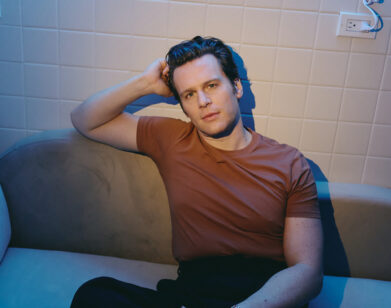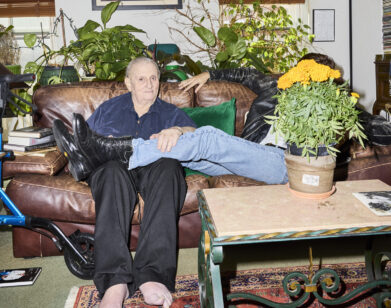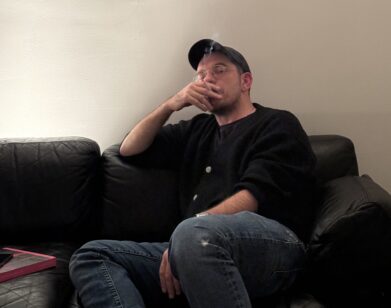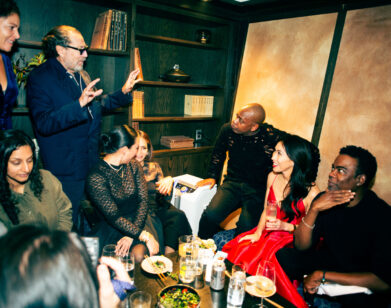icon(s)
Tonya Pinkins and Karen Olivo Are Envisioning New Worlds
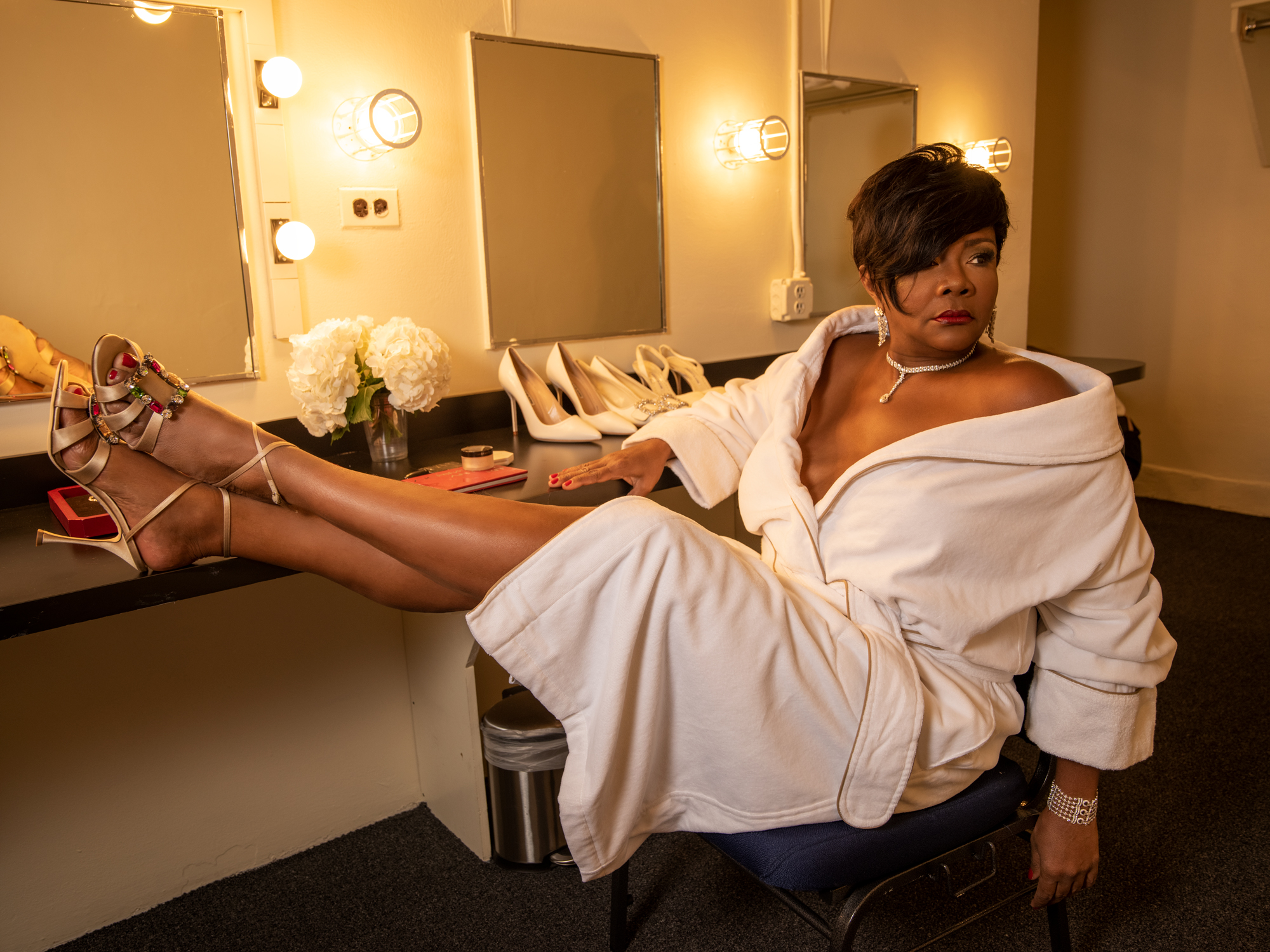
Tonya Pinkins reclining in a dressing room at the August Wilson Theatre on West 52nd Street. Robe by Frette. Earrings by Reflection De Cartier High Jewelry. Necklace by Cartier Jewelry. Bracelet by Pluie De Cartier High Jewelry. Shoes by Manolo Blahnik.
In our September issue, we assembled a portfolio of five legendary Grand Dames of Broadway who define elegance, drama, humor, and grace, and who our guest-editor Jeremy O. Harris called “the foundation of New York’s theatrical heartbeat.” In the third of five, the actor and singer Tonya Pinkins speaks to the fellow Tony Award winner Karen Olivo about the importance of controlling the narrative, the evolution of Broadway, and why creativity is just like sex.
BROADWAY DEBUT: Merrily We Roll Along, 1981
SIGNATURE ROLES: Sweet Anita in Jelly’s Last Jam, Caroline in Caroline, or Change
TONY AWARDS: 1
YOUTUBE IT: “Lot’s Wife”
INTERVIEWED BY: Tony Award-winning actor Karen Olivo
———
TONYA PINKINS: Hi, Karen. Pleased to meet you.
KAREN OLIVO: So wonderful to take a little bit of your time today.
PINKINS: My pleasure.
OLIVO: What success do you feel you have gained throughout your really long career that is not something we can see in a bio?
PINKINS: I don’t know if you saw my feature film, Red Pill.
OLIVO: I haven’t, but I’m ready.
PINKINS: That was the first time in my career that I got to control the narrative. I wrote it, I produced it, I financed it, I directed it, I cast it, I art-directed it, I costume-designed it. I did every job. The power of having that kind of control and realizing that white men have had that kind of control for millennia, I got to experience in an unfiltered way. In every other way that we work as artists, we’re shaping ourselves to someone else’s vision. But because I financed the film and I was the bottom line, when people’s vision would bump up against mine, I could test that against my instinct and say yes or no, which was a power I never had. It was as thrilling as birthing my four children.
OLIVO: Wow. Can we go a little further into that? Because power dynamics, especially in our business, boil down to who has money and who has status. In those moments in which you had the power, was there anything that surprised you?
PINKINS: It surprised me how delighted I was when white women told me they didn’t like things about it, and I would say, “Oh, good. It’s working. Now you feel how I feel when I watch most things.”
OLIVO: That’s really good. What was the thing that made you decide that you had to be in the driver’s seat in all lanes?
PINKINS: I don’t think I made that decision fully until finishing this film. After a year of working at Yale, and then working at The New Group, and then doing Mother Courage and Her Children, those were three difficult creative processes where I felt that my experience and artistry were not only not valued or respected, they were dismissed and discarded. It’s like people wanted me to be a paper doll. After those three shows, I stopped doing theater. People would offer me things, and I’d think, “I’m going to get in the room and those people are going to be unhappy with me, so I’m not going to do that to them.” And I just started focusing on TV, where you show up to be a paper doll. In the theater, you can’t show up to be a paper doll. You’re putting in too many hours. You have to open a vein to do theater.
OLIVO: This fascinates me because I’ve done some TV, but I felt the same way, about being an empty vessel, and the moment you start to sweat, they stop you. The moment you actually start to feel something, they’re like, “No, no, no.” I love what you’re talking about, in terms of theater being something that is a complete body experience. Everything that you have is inside of that. Do you feel like you ended up not doing things that you wanted to?
PINKINS: No. There was nothing I turned down that I was really excited about, because generally I don’t take jobs because of a script. I take jobs because there are people in a room that I admire and that I can learn from. I just want to get in the room and play with them.
OLIVO: That is fascinating to me. I’ve been in the business for 25 years, and I have not encountered someone like you. You’re the person who really does lead with what feels like an internal compass that most people in this industry ignore. How do you maintain that center?
PINKINS: As an artist, I have always had something that I never had as a human being. I always knew that the work I was doing was coming from some divine place I had no control over. In my early years it scared me, and I used to self-sabotage performances just to go, “Can I mess it up, or is it a thing that I can’t control?” I trained a lot to make sure that I could be worthy of this thing, but I was always aware that there was something coming through me that was not anything I could own. I knew it had value in a way that I didn’t know I personally had value.
OLIVO: That makes me so emotional, because I’m not as far along in my career, yet everything you’re saying feels like my own experience, but I feel like I’m in a bubble by myself. Now I understand that it is a framework by which people exist and I’m not alone in feeling like these things are really fucking important.
PINKINS: And you’re not going to get support from it in a society where what we’re sold all day and what is elevated over everything is capitalism and making money. It’s almost like your artistry isn’t even valued unless they can figure out how to commoditize it.
OLIVO: Absolutely. This is the thing that I struggle with. You’ve seen what this fucking year has been like for our industry. You’ve seen the caucacity on multiple levels. I don’t have to say anything about that. Do you believe that there’s redemption in our next phase? Is there a next phase?
PINKINS: That’s funny. Nothing has changed. Juneteenth becomes a holiday. It’s symbolism, which costs nothing. How do we soothe the savage beast and quiet them and calm them and get them to move on so we can be comfortable again? Nothing’s changed. And in fact, the wealthy got wealthier, so it worked for them. There was not even a loss in the pandemic to those in power.
OLIVO: Exactly.
PINKINS: What I see from artists is this irritation that was allowed to come up. Before, when I was working and the art was feeding me, and the money was paying my bills, I could ignore this pebble in my shoe. But now that everything’s gone quiet, I feel the pebble in my shoe.
OLIVO: I think the key forward is the kids who are about to break into the business. They need our guidance, and between the two of us, if we can get the college kids or high school kids, and my generation and your generation together, I feel like that’s it. I feel like that’s wisdom and that’s fucking moxie. Am I off?
PINKINS: I don’t know. I look at young people today looking at their parents and saying, “I don’t want that life.” I don’t know any young people that would look to older people and see them as guides. They’re like, “I don’t want that. That’s its own little cage.” Young people have to envision a world that has never existed before, because what the people before them built is not working.
OLIVO: Yes, yes, yes. I don’t know if you saw my Instagram video where I basically quit, but I said we need to build something that we have never seen.
PINKINS: Yes. And that requires sitting in the mystery and the discomfort of not knowing, because then you can make a space for something to come in from beyond the veil. But everybody wants quick solutions.
OLIVO: I’ve given up on the industry because it’s all about monetizing something that I believe is god-given. But I haven’t given up on the dream of, like you said, getting into a room with people because you know you’re going to create something and you can’t fucking wait to see what it is that you create.
PINKINS: It’s like sex.
OLIVO: Exactly. But we have to get the business out of the way, because the business is not interested in that purity.
PINKINS: Our industry may need to die so that the real artists that are the soul of the nation can come forward. I was a Tony voter for years and it was a waste of my damn time, most of the stuff I saw was so terrible. But there is so much great stuff happening in the world that I’m hopeful. They can’t make money off of somebody who’s doing their work for the joy of it. You can’t make money off of that. When people tell me I’m difficult, I say, “Yeah, for rich people, it’s difficult when you can’t buy somebody. When there is no amount of money you can pay someone for them to do what you want them to do. That’s difficult.”
OLIVO: There’s a culture that exists in our industry, in which we talk about being a family, but when it comes down to it, we’re not there to back each other up.
PINKINS: At a certain point, you realize that people’s thoughts revolve primarily around themselves and that everyone is doing the best they can in every moment. And sometimes they show up. Even if they showed up and fucked up, their intention was to show up. Something in them didn’t allow them to be what was needed, but they tried. They wanted to. And I try to have gratitude for people showing up.
OLIVO: That’s beautiful. You’re giving me something that is going to fuel me for quite some time.
PINKINS: May it be so.
———
Hair and Makeup: Maija using Fenty Beauty and Nars.
Photography Assistant: Lance Charles.
Fashion Assistant: Kiana Polk.
Special Thanks: August Wilson Theatre.

